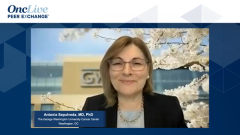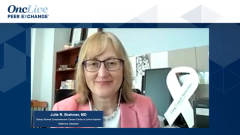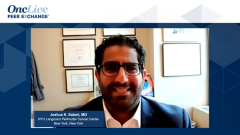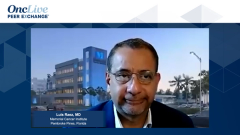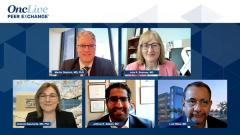
Is There a Role for Immunotherapy in Patients with KRAS G12C-Mutant NSCLC and STK11 or KEAP1 Co-Mutations?
Luis Raez, MD, offers insights on how co-mutations in STK11 or KEAP1 impact the use of immunotherapies in KRAS G12C–mutant non–small cell lung cancer.
Episodes in this series

Transcript:
Martin Dietrich, MD, PhD: Dr Raez, we’ve seen across the board independent of PD-L1 level, independent of secondary STK11/KEAP1 mutations, nice responses to the inhibitors. But let’s go one step back in the KRAS subset, and I think Dr Raez you touched on this earlier. You have a patient [who] has an STK11/KRAS comutation. Do you alter your thoughts on immunotherapy in the first-line setting? There [are] all retrospective data, but consistent across many clinical trials. How do you approach a first-line patient?
Luis Raez, MD: That’s very painful because you’re watching the roof because you know that they may not do well with the current knowledge that we have. All of us have our publications about STK11. But I think at the last ASCO [American Society of Clinical Oncology Annual Meeting], Dr [inaudible] with the Caris consortium, like we are 85 cancer centers publishing together, we have an interesting poster with 27,000 tumors that we profile. It’s the largest of STK11, KEAP, and TP53. And it’s the same that everybody else already published. It’s amazing that if you give chemo-immunotherapy with a positive KRAS, you can survive 23 months. But when you have the KEAP and you have the TP53 and STK11, your survival can go down to 8 months. And 8 months is horrible; it’s better to use chemotherapy alone. That’s the survival that we used to get in 2001 with the 4 doublets that we used to have. That’s why it’s very painful to me when I see this in the genomic profile. But at the same time, we don’t have anything better.
That’s why it was very exciting when they presented POSEIDON, the tremelimumab, durvalumab, and the chemo[therapy] combination that Melissa Johnson, MD, presented last year, that there was a subset of STK11 patients [who] apparently are doing better. Because all the data that we have that is a bad gene, is with carboplatin and pemetrexed, and the regimens that we have been using in the last 3 or 4 years. So that’s why due to the lack of knowledge some [individuals] prefer to use POSEIDON, some prefer CheckMate 9LA, ipilimumab-nivolumab plus chemotherapy. We’re throwing the kitchen sink here because we don’t have anything better.
And I think it will be controversial too because most of the studies are retrospective and not prospective, to think, “Because you have STK11 or KEAP1, not going to give him IO [immunotherapy].” It is a little bit hard, but maybe we’re going to arrive the day that we must start to say these things because we have a lot of difficulty trying to find which patients are going to respond. Because PD-L1 is weak, [inaudible] we’re still unable to find a harmonization. But maybe also there are patients [who] will never respond to IO, and it’s better to try to identify them. Maybe we can do a score with the TP53, KEAP, and all these bad genes, and then one day to determine maybe we can spare immunotherapy for some patients. I would not be surprised that maybe that’s a reality and then maybe these are the patients [who] can go to ADCs [antibody-drug conjugates] or any other modality of therapy in the future.
Martin Dietrich, MD, PhD: That’s a very comprehensive summary. We’re going to see more KRAS inhibitors, more KRAS inhibitor combinations. It’s obviously a developing strategy. It’s very challenging when you have a subset that is responsive to both immunotherapy and targeted therapy.
Transcript is AI-generated and edited for clarity and readability.


